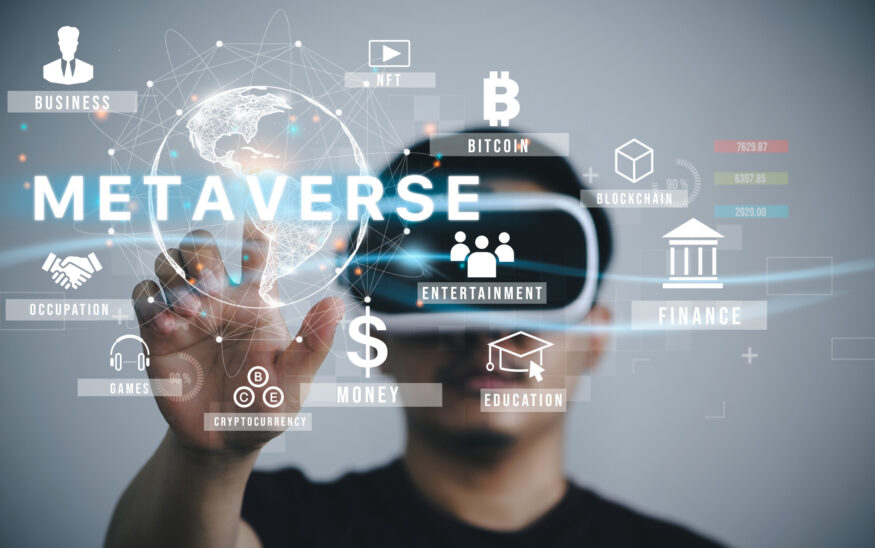How the Metaverse is Revolutionizing Industries: From Sci-Fi Fantasy to Digital Reality
The metaverse is affecting much more than the entertainment industry, and just might change the business world forever.
Harish Mukkawar //August 16, 2023//


How the Metaverse is Revolutionizing Industries: From Sci-Fi Fantasy to Digital Reality
The metaverse is affecting much more than the entertainment industry, and just might change the business world forever.
Harish Mukkawar //August 16, 2023//
The metaverse, once considered a distant sci-fi concept, is rapidly becoming a reality in the digital landscape. This interconnected virtual realm, where individuals can interact, socialize and engage in various activities, is poised to revolutionize the way we perceive and experience the internet. In 2023, the metaverse is already revolutionizing certain industries.
With the convergence of augmented reality (AR), virtual reality (VR), artificial intelligence (AI) and blockchain technologies, the metaverse promises to unlock a realm of infinite possibilities, changing the way we work, play and connect with others.
READ: AI Revolution: Unveiling the Transformative Power and Unforeseen Consequences
Understanding the metaverse
The metaverse can be described as an interconnected, immersive and shared virtual space where multiple users can interact with each other and digital objects in real time. It goes beyond traditional 2D platforms by incorporating 3D experiences that allow users to navigate and interact with the virtual world using their avatars. In essence, the metaverse aims to bridge the gap between the digital and physical worlds, therefore revolutionizing industries and creating a seamless blend of reality and imagination.
A convergence of technologies
The metaverse draws its strength from a convergence of cutting-edge technologies. Virtual reality (VR) provides an immersive experience, where users can transport themselves into digital worlds. Augmented reality (AR) enriches the real world with virtual elements, blending the physical and virtual realms. Artificial intelligence (AI) plays a crucial role in creating lifelike interactions and enabling virtual entities to behave intelligently. Lastly, blockchain technology ensures the metaverse’s security, transparency and decentralized nature, enabling the ownership of virtual assets.
Applications and impact
The applications of the metaverse are vast and varied, with significant implications for multiple industries. In the field of entertainment, it opens doors for fully immersive gaming experiences, where players can interact with the gaming environment and each other in a more lifelike manner. Additionally, artists and content creators can explore new dimensions of creativity, developing virtual art galleries, concerts and theatre performances.
The metaverse also has the potential to revolutionize education and training. Students can dive into historical events, explore scientific concepts in 3D, and collaborate with peers from around the world. Moreover, professionals can engage in virtual training sessions and simulations, accelerating skill development and knowledge retention.
The business landscape will also be impacted significantly. Virtual offices and meeting spaces will redefine remote work, making it more engaging and productive. Companies can host virtual conferences, expos and product launches, reaching a global audience effortlessly. Moreover, e-commerce will be revolutionized, as consumers can try out products virtually before making a purchase.
READ: 8 Steps for Creating an Omnichannel E-commerce Strategy
Social impact and concerns
The metaverse will undoubtedly reshape social interactions. Virtual communities and social platforms will become the norm, allowing people to connect and socialize regardless of geographical barriers. However, as with any emerging technology, there are concerns to address. Privacy and data security will be critical challenges, as personal information is shared and stored within the virtual space. Ensuring that the metaverse remains a safe environment free from harassment and exploitation will also be a priority.
READ: Artificial Intelligence for Social Good: Transforming Global Challenges with Innovative Solutions
Digital inclusivity and accessibility
To harness the metaverse’s full potential, accessibility must be at the forefront of development. Ensuring that people with disabilities can fully participate and experience the virtual world is essential. This includes accommodating those with visual, hearing and motor impairments, and designing interfaces that are intuitive and user-friendly for all demographics.
Regulation and governance
As the metaverse evolves, the need for thoughtful regulation and governance becomes paramount. Balancing innovation with ethical considerations will be critical to prevent misuse or the creation of digital monopolies. Establishing standards for virtual asset ownership and resolving potential legal disputes within the metaverse will also be a complex task.
Harish Mukkawar is a highly skilled and experienced digital marketer who has dedicated his career to driving online success for businesses. With a strong passion for data-driven strategies and a deep understanding of consumer behaviour, Harish has become an invaluable asset in the field of digital marketing.

























